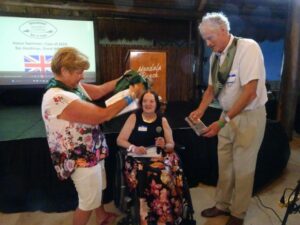Our congratulations go to club member Ros Hardiman, who has been inducted into the International Marathon Swimming Hall of Fame as part of the Class of 2024. The ceremony was held in Cancún Mexico on 18 May.
She came home with a certificate, a sash and a plaque! At the celebration dinner she had to give a speech to thank the people who had helped her during her swimming career – a bit like the Oscars!
Ros says:
It is a great honour to be nominated, there were thirteen successful nominees this year. I was the only British swimmer, the other Briton was recognised for his coaching and administrative contributions to the sport.
I was determined to accept the award in person although Cancún would not normally be my resort of choice. It caters for a young clientele, either for the beach bar/ night club seekers or for families with young children. Also, Mexican hotels are rarely disability friendly and there were several access challenges, not least getting into the IMSHOF afternoon Congress. I can now say that I have seen the grimy underparts of a Mexican 4-star hotel, having to use the service lift and go through the hotel laundry area…
On the Friday night we had an informal dinner in a local Mexican restaurant, honourees present getting to know each other and to meet members of the committee. On Saturday the afternoon was devoted to the Congress, discussing selection criteria, types of swims and what can be done to promote the sport.
In the evening the official induction ceremony and dinner took place. Each nominee was introduced by an existing member of IMSHOF, then the honouree had to give a formal acceptance speech, limited to three minutes. Like the Oscars, you were supposed to thank those who had helped you along the way as your introducer had given an outline of your swimming career. It was rehearsed, recorded on Zoom and translations into Spanish were available via people’s phones. I hope I did justice to my pilots for the Channel, Windermere and Loch Ness as well expressing my thanks to IMSHOF.
I was duly inducted, given a sash, plaque and certificate.
I’d hoped to take part in the El Cruces marathon race but all the places were sold out, most it has to be said having taken by locals early on at the start of registration so not many were available and it would have been a good idea to make sure that IMSHOF members had reserved places. As it was I managed to get several swims in but it wasn’t the same. The water temperature was 27° – the week before at Dover it was 10.8°!
As add-ons I got to several Mayan sites and the Mayan Museum as well as visiting nature reserves to see an amazing amount of local wildlife and scenery.
Although Cancún didn’t appeal to me, I was interested to see it and horrified to recognise its environmental and economic vulnerability. No part of the 20km hotel zone is 4 metres above sea level, located on a thin sandy strip between a lagoon and the sea. In the hotel zone there are no private houses, it’s all hotels, rental apartments, and commercial properties (well, admittedly, two small Mayan sites). There is no agriculture in the surrounding area and the economy is totally reliant on tourism. Sea level rises and reduction in tourism will devastate the lives of many local people who are dependent on tourism for their living. The classic Mayan civilisation collapsed in the 10th century, with an estimated 70% population loss partly as a result of drought and political fragility – perhaps a lesson from local history?
Already since my return, the chairman of IMSHOF has recruited me to become involved with the committee and education work for the organisation. There’s no such thing as a free sash!


